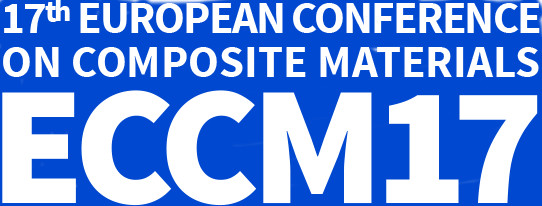

App-Einstellungen:
ON THE MULTI-FUNCTIONAL BEHAVIOR OF GRAPHENE BASED NANO-REINFORCED POLYMERS
Stavros Tsantzalis (University of Patras) Christina Kostagiannakopoulou (University of Patras) George Sotiriadis (University of Patras) Vassilis Kostopoulos (University of Patras)
The objective of present work is to investigate the influence of Graphene Nano-Platelets on the multi-functionality of nano-reinforced epoxy polymers. Thermal conductivity measurements, thermo-mechanical and mechanical tests were performed.
STRENGTHENING MECHANISM OF GRAPHENE/METAL NANOLAYERED COMPOSITES
Zhenyu Yang (Beihang University) Dandan Wang (Beihang University) Jian Sun (Beihang University) Zixing Lu (Institute of Soild Mechanics, Beihang University)
MD simulation was employed to investigate the deformation mechanisms of graphene/metal nanowires with layered structures. The strengthening mechanisms of nanolayered composites nanowires are revealed as dislocations blocked by graphene layers.
IMPACT PROPERTIES OF GRAPHENE MODIFIED POLYMERS AND COMPRESSION AFTER IMPACT (CAI) PROPERTIES OF GRAPHENE MODIFIED CFRPS
Christina Kostagiannakopoulou (University of Patras) Stavros Tsantzalis (University of Patras) George Sotiriadis (University of Patras) Vassilis Kostopoulos (University of Patras)
Present study investigates the influence of GNPs on the impact behavior of nano-reinforced polymers and CFRP laminates. Charpy tests reveal that the introduction of GNPs into the polymer improved 50% the impact resistance of the reference material.
ADDITIVE EFFECTS IN HYBRID MULTIFUNCTIONAL GRAPHENE-GLASS FIBRE-POLYPROPYLENE COMPOSITES
Dimitrios Papageorgiou (University of Manchester) Robert Young (University of Manchester) Ian Kinloch (University of Manchester)
The effect of the presence of graphite nanoplatelets (GNP) and glass fibres (GF) both individually and simultaneously in an isotactic polypropylene matrix was evaluated.
THE EFFECT OF GRAPHITE NANOPLATELETS (GNP) ASPECT RATIO AND HEAT TREATMENT ON NYLON 6/GNP NANOCOMPOSITES
Muhammad Khairulanwar Mohd Halit (University of Manchester) Arthur Wilkinson (University of Manchester)
The effect of GNP aspect ratio and GNP heat treatment on PA6 matrix were studied. Nanocomposites were processed using melt compounding method and characterised for thermal and mechanical properties. Results obtained were compared to unfilled PA6.
ELECTRICAL AND THERMAL CONDUCTIVITY OF AEROGEL/EPOXY COMPOSITES
Svenja Garlof (Technische Universität Hamburg-Harburg) M. Mecklenburg (Technical University Hamburg) R. Adelung (Kiel University) D. Smazna (Kiel University) Bodo Fiedler (Technische Universität Hamburg-Harburg) K. Schulte (Technical University Hamburg)
In this paper we present the production of two carbon aerogels, Aerographite and a CNT foam, their processing into an epoxy composite and their electrical and thermal properties.
UNIAXIAL LOADING OF POLYMER-EMBEDDED GRAPHENE: IS ORTHOGONAL BUCKLING AVOIDABLE?
Maria Giovanna Pastore Carbone (FORTH/ICEHT) Georgia Tsoukleri (FORTH/ICEHT) Ioannis Polyzos (FORTH/ICEHT) John Parthenios (Institute of Chemical Engineering Sciences/Foundation of Research and Technology Hellas) Konstantinos Papagelis (Institute of Chemical Engineering Sciences/Foundation of Research and Technology Hellas) Costas Galiotis (Institute of Chemical Engineering Sciences/Foundation of Research and Technology Hellas)
Graphene micro-ribbons have been designed to prevent orthogonal buckling associated with axial tensile deformation of graphene. Micro-ribbons were produced via UV lithography/oxygen plasma treatment and characterized by using Laser Raman Microscopy.
VERTICALLY AND DENSELY ALIGNED REDUCED GRAPHENE OXIDE/POLYDIMETHYLSILOXANE COMPOSITE FABRICATED BY A TWO-STAGE REDUCTION METHOD FOR HEAT-TRANSFER IN THERMAL INTERFACE MATERIALS
Dong Han (Peking University) Yun-Hong Zhao (Peking University) Shu-Lin Bai (Peking University)
In this work, we report a more efficient and simple method to fabricate a thermal-reduced vertically aligned reduced graphene oxide (TR-VArGO)/polydimethylsiloxane (PDMS) composite, which has a high thermal conductivity of 1.349 W m-1 K-1.
IMPROVED MECHANICAL AND ELECTRICAL PROPERTIES OF CFRP MULTIAXIAL LAMINATES BY EMBEDDED METAL FIBERS
Benedikt Hannemann (Institute for Composite Materials) Sebastian Backe (Institute of Materials Science and Engineering (WKK)) Sebastian Schmeer (Institute for Composite Materials) Frank Balle (Technical University of Kaiserslautern) Ulf P. Breuer (Institute for Composite Materials)
A steel and carbon fiber reinforced epoxy is investigated. Tests are conducted on coupons with different metal fiber volume fractions and various laminate archtitectures to analyze the electrical and mechanical material properties.
INTERLAMINAR AND INTRALAMINAR PROPERTIES OF CARBON SPREAD TOW AND GLASS FIBRE HYBRID COMPOSITES FOR COST SAVING IN THE MASS PRODUCTION OF AUTOMOTIVE COMPONENTS
Tomas Katafiasz (Imperial College London) Lorenzo Iannucci (Imperial College London) Emile Greenhalgh (Imperial College London)
Characterising cost effective materials such as fibre hybrid composites is important in the automotive industry. This paper addresses two typical component failure modes found within such hybrids, these being interlaminar and intralaminar failure.
